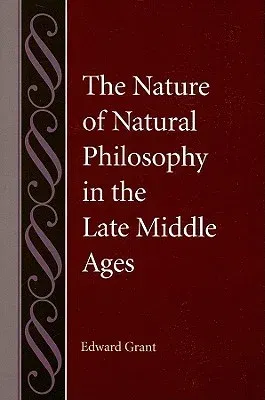The period from 1200 to 1500 laid the intellectual and institutional
foundations for the Scientific Revolution that would occur in the
seventeenth century. During this time, the spirit of inquiry motivated
natural philosophers more than did substantive content or arguments.
Natural philosophers posed hundreds of questions about nature and
weighed the pros and cons of each. In the process, they developed a
philosophical approach to nature that may be characterized as "probing
and poking around"--they used their imaginations guided by reason.
In this volume, distinguished scholar Edward Grant identifies the vital
elements that contributed to the creation of a widespread interest in
natural philosophy, which has been characterized as the "Great Mother of
the Sciences." He discusses how natural philosophy emerged in Western
Europe in the Middle Ages with Latin translations of Aristotle's
treatises on natural philosophy in the twelfth and thirteenth centuries;
with universities devoting arts curriculums to Aristotle's rationalistic
natural philosophy; and with Christian religious authorities coming to
accept and even defend that philosophy.
Medieval natural philosophers, contrary to a common perception, did not
slavishly follow Aristotle. Grant shows that they quite frequently
disagreed with Aristotle and proposed their own solutions to many
problems he raised. They did this by rejecting many of Aristotle's
explanations about real physical phenomena and replacing them with
radically different interpretations. Concepts and ideas that Aristotle
regarded as naturally impossible--the existence of other worlds, for
example-- were also investigated and deemed possible and intelligible.
The product of many years of extensive research, the essays included in
this volume offer a significant contribution to the nature of natural
philosophy and its influence on the Scientific Revolution of the
seventeenth century.
Edward Grant is Distinguished Professor Emeritus of History and
Philosophy of Science at Indiana University. The Foundations of Modern
Science in the Middle Ages and Science and Religion, 400 B.C. to A.D.
1550: From Aristotle to Copernicus are among his many publications.
PRAISE FOR THE BOOK
"Grant is a scholar of world-wide reputation, a first-class authority on
this demanding field of research. The essays included here form a
substantial and significant panorama of late medieval science on the
verge of its transformation."--Nicholas Rescher, professor of
philosophy, University of Pittsburgh
"The author's contribution has been monumental. Much of modern
understanding of medieval ideas about natural philosophy and cosmology
rests on Edward Grant's scholarship."--Steven J. Livesey, professor of
the history of science, University of Oklahoma.

